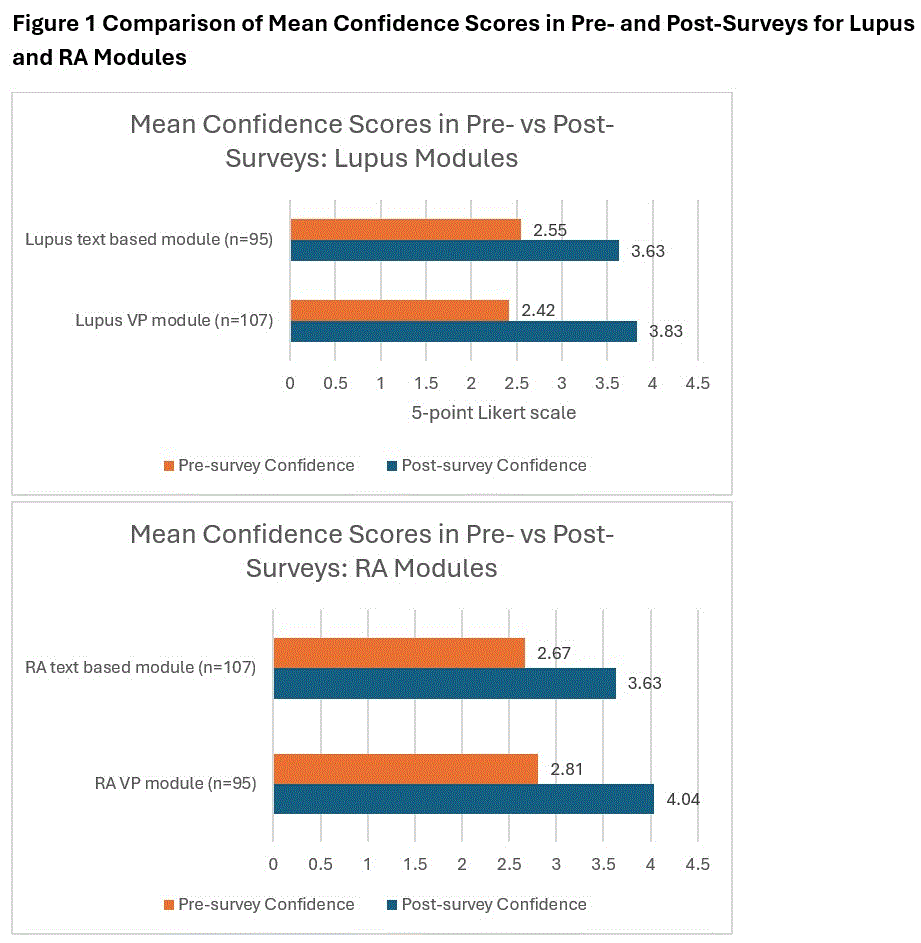Session Information
Session Type: Abstract Session
Session Time: 3:00PM-3:15PM
Background/Purpose: Internal medicine (IM) residents often receive limited rheumatology training, contributing to low confidence in managing rheumatologic conditions and suboptimal performance on standardized examinations. Virtual patient (VP) modules—interactive, multimedia cases simulating real-life scenarios—offer a promising alternative by promoting clinical reasoning and learner engagement. Rooted in cognitive load and multimedia theories, VP modules may offer advantages over traditional text-based learning, which often lacks interactivity and real-world complexity. While prior research has demonstrated the effectiveness of VPs compared to no intervention, evidence comparing VPs to text-based modules in graduate medical education, particularly in rheumatology, remains limited.
Methods: In a multi-site, randomized crossover study, 202 IM residents from 16 U.S. residency programs were randomized into two groups: Group A completed a VP module on systemic lupus erythematosus (SLE) and a text-based module on rheumatoid arthritis (RA), while Group B completed a VP module on RA and a text-based module on SLE. Clinical reasoning was assessed via 10-item multiple-choice pre- and post-tests. Self-reported confidence was measured using 5-point Likert-scale items. Learner perceptions were evaluated through a pre-validated survey and open-ended questions. Student’s t-tests compared change in pre- and post-test scores, self-rated confidence, and perceived module effectiveness. These abstract reports interim results from data collected between Feb’24 and Jan’25.
Results: Interim analysis indicates that both module types improved knowledge. However, VP modules led to greater gains in post-test scores compared to text-based modules in both RA and SLE; differences were statistically significant in SLE (p = 0.05) and in RA (p = 0.02) modules. (Table 1). Compared to pre-survey confidence, residents who completed VP modules reported significantly higher post-survey confidence in diagnosing, evaluating, and managing both SLE and RA (p < 0.0001; Figure 1). They also rated VP modules as significantly more effective in reinforcing diagnostic reasoning and clinical decision-making skills (p < 0.0001; Figure 2). Open-ended feedback reflected a strong learner preference for VP modules, describing them as more engaging and realistic. Key benefits included interactive dialogue, clinical decision-making prompts, and visual content. Some residents described the VP format as lengthy or repetitive, while others appreciated its alignment with real-world reasoning.
Conclusion: Preliminary findings suggest that VP modules led to greater knowledge and confidence gains compared to text-based modules and VPs were preferred by learners. These findings support integrating VP-based learning into rheumatology education, especially in settings with limited faculty or clinical exposure as they offer a scalable, engaging approach to preparing IM residents for real-world rheumatologic care. Although long-term retention and sustained confidence were not assessed, future studies will be important to determine their lasting impact.
 Data are presented as mean percent correct (standard deviation). P-values based on unpaired t-tests comparing Group A and Group B at each timepoint. Difference reflects the absolute change from pre- to post-test scores. *Group A – VP module on lupus (highlighted in grey) and text-based module on rheumatoid arthritis; Group B – text-based module on lupus and VP module on rheumatoid arthritis (highlighted in grey).
Data are presented as mean percent correct (standard deviation). P-values based on unpaired t-tests comparing Group A and Group B at each timepoint. Difference reflects the absolute change from pre- to post-test scores. *Group A – VP module on lupus (highlighted in grey) and text-based module on rheumatoid arthritis; Group B – text-based module on lupus and VP module on rheumatoid arthritis (highlighted in grey).
.gif) Likert scale: 1 = strongly disagree, 2 = Disagree, 3 = Neither agree or disagree, 4 = Agree, 5 = strongly Agree.
Likert scale: 1 = strongly disagree, 2 = Disagree, 3 = Neither agree or disagree, 4 = Agree, 5 = strongly Agree.
To cite this abstract in AMA style:
Kiwalkar S, Desmarais J, Snyder E, Schroeder L, Meissner M, Rolle N, Donohue S, Bettendorf B, Khanna I, Kruzer K, Emejuaiwe N, Gad I, Leverenz D, George M, Makol A, Ernste F, Blaszczak J. Rheum2Learn: A Randomized Trial of Virtual vs Text-Based Rheumatology Modules [abstract]. Arthritis Rheumatol. 2025; 77 (suppl 9). https://acrabstracts.org/abstract/rheum2learn-a-randomized-trial-of-virtual-vs-text-based-rheumatology-modules/. Accessed .« Back to ACR Convergence 2025
ACR Meeting Abstracts - https://acrabstracts.org/abstract/rheum2learn-a-randomized-trial-of-virtual-vs-text-based-rheumatology-modules/

.gif)